Category Archives: AOA News Letter
SECURING RIGHTS, STRENGTHENING INSTITUTIONS: PDHJ AND KOMNAS HAM SIGN LANDMARK TWO-YEAR COOPERATION PACT.
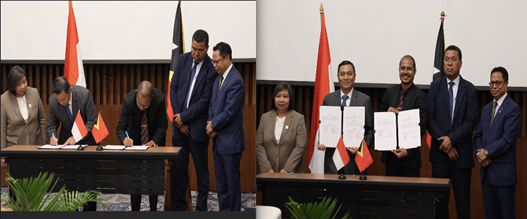
JAKARTA, Indonesia, 20 November 2025 – In a significant step to strengthen bilateral ties, the human rights institutions of Timor-Leste and Indonesia have signed two pivotal cooperation agreements set for a two-year duration. The Ombudsman for Human Rights and Justice of Timor-Leste (PDHJ), represented by its Executive Secretary, Ambrosio Graciano Soares, and the National Commission on Human Rights of Indonesia (KOMNAS HAM), represented by its General Secretary, Henry Silka Innah, formalized the partnership. The first agreement focuses on the advancement and protection of the human rights of communities living along the shared Timor-Leste-Indonesia border. The second is dedicated to mutual capacity-building and institutional development to enhance both bodies’ effectiveness.
This signing ceremony, held at Le Méridien Hotel in Jakarta on November 20, 2025, marks the concrete implementation of a Memorandum of Understanding (MoU) signed by the heads of the two institutions on November 20, 2023. The event was elevated by the presence of PDHJ Chairperson Virgilio da Silva Guterres, the Chairperson of KOMNAS HAM Anis Hidayah and the Ambassador of Timor-Leste to Indonesia, Roberto Soares, underscoring the strategic importance both nations place on this collaboration.
The newly activated agreements establish a robust framework for joint initiatives over the next two years, directly addressing the unique challenges faced by border communities while simultaneously fortifying the institutional prowess of PDHJ and KOMNAS HAM. This fixed term provides a clear timeline for achieving concrete outcomes, ensuring focused efforts to foster a cross-border culture of human rights and justice. The partnership sets a new standard for targeted, results-oriented regional cooperation in safeguarding fundamental freedoms.
“STRENGTHENING INSTITUTIONAL HARMONY IN COMBATING VIOLENCE AGAINST WOMEN” REPORT RELEASED TO THE PUBLIC.
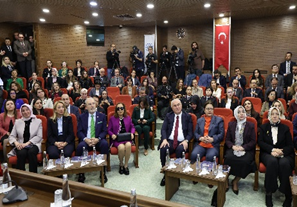
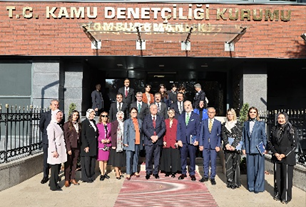
The Ombudsman Institution introduced its new special report entitled “Strengthening Institutional Harmony in Combating Violence against Women: The Central Anatolia Example” on 26 November 2025. The event, hosted by the Chief Ombudsman of Türkiye, Mr. Mehmet Akarca, brought together senior government officials, parliamentary committee members, and members of the press. In his speech, Mr. Akarca underlined that violence against women is a serious human rights violation and emphasized the need for zero tolerance as well as coordinated institutional action. He highlighted that field visits were conducted across nine provinces and nearly 200 interviews were held in preparation for the report. Presenting the report, Ombudsperson Ms. Fatma Benli Yalçın, responsible for women’s and children’s rights, noted that the findings and recommendations aim to strengthen nationwide efforts and provide concrete solutions to enhance the effectiveness of combating violence against women.
EFFECTIVE ACTIONS BY PUNJAB OMBUDSMAN’S OFFICE ON OVERPRICING, VIOLATION OF OFFICIAL RATES, AND SALE OF SUBSTANDARD GOODS.
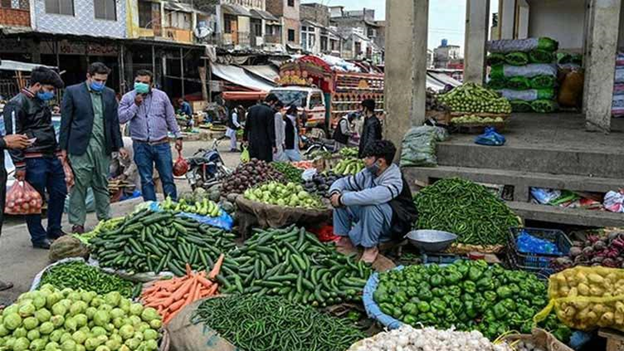
The Office of the Ombudsman Punjab launched a comprehensive crackdown against overpricing, adulteration, and the sale of substandard or unsafe food items. A series of public complaints to the Ombudsman Office resulted in the immediate inspection across Punjab.
On the directives of the Ombudsman Office, Punjab Food Authority (PFA) conducted a detailed inspection on the quality and pricing of essential daily-use commodities, which revealed widespread violations, including inflated prices, compromised quality, and the sale of unhygienic products. The crackdown extended to hotels and restaurants operating under poor hygiene conditions. Rs. 8,650,000 fines were imposed, marking a significant action to promote consumer rights and public health.
These actions from the Ombudsman Punjab aim to ensure the availability of safe, hygienic, and fairly priced food items throughout Punjab.
PDHJ MEETS EDTL TO ADDRESS ELECTRICITY SUPPLY ISSUES IDENTIFIED IN ATAURO INSPECTION.
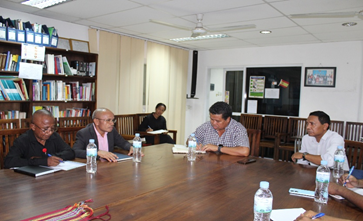
Dili, 7 November 2025 – Provedor for Human Rights and Justice, Virgílio da Silva Guterres ‘Lame hosted a meeting with Eletricidade de Timor-Leste (EDTL) leadership, including Executive Commission President Paulo da Silva and his technical team, to discuss the findings from PDHJ’s recent surprise inspection of the electricity supply in Atauro, which currently operates for only 18 hours per day.
During the meeting, the Ombudsman briefed the EDTL President on a recent inspection visit by the Quadrilateral team, composed of PDHJ, CAC, CFP, and IJE, to the EDTL Atauro station. The team assessed electricity supply issues and highlighted the human rights perspective, emphasizing that all residents deserve continuous access to electricity, even though the current supply is limited to 18 hours daily.
Paulo da Silva explained that EDTL Atauro operates three diesel generators with a total capacity of 3.6 MW. One generator produces 1.2 MW, while the other two are older units installed in 2007–2008, and have reached the end of their designed operational lifespan. Therefore, continuous 24-hour electricity supply is not feasible with the current equipment.
Fuel storage capacity is also limited. Although the station can hold 65 tons of diesel, this is sufficient for only 30–31 days of operation, further restricting continuous electricity provision. Despite these constraints, electricity supply has improved from the initial 12 hours to 18 hours per day, marking significant progress, though the risk of sudden generator failure remains.
To address long-term supply, EDTL is collaborating with Australian consultants from the Northern Territory on a feasibility study to install a 2–3 MW solar photovoltaic (PV) system with battery energy storage, integrated with the existing diesel generators to create a hybrid system capable of achieving 24-hour electricity supply. The tendering process is expected in the coming months, with project completion targeted for December 2026 or January 2027.
Paulo also noted that local residents often request extended electricity hours during important events or gatherings. EDTL accommodates these requests whenever possible, but it requires careful operational planning and additional resources.
EDTL emphasized that long-term financial sustainability remains a challenge. Electricity tariffs alone do not fully cover operational and maintenance costs. Currently, three remote villages rely on standalone solar PV systems due to access limitations, and plans are underway to expand solar infrastructure to additional areas once land becomes available.
Overall, EDTL continues to strive to improve electricity access in Atauro, aiming for a reliable 24-hour supply while balancing technical, operational, and financial constraints.
CHEIF OMBUDSMAN OF TÜRKIYE, MR. MEHMET AKARCA, PAID A VISIT TO BELGRADE UPON THE INVITATION OF THE PROTECTOR OF CITIZENS (OMBUDSMAN) OF SERBIA.
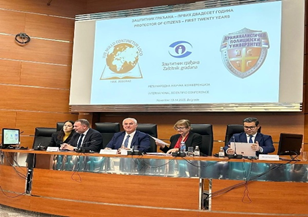
Chief Ombudsman of Türkiye, Mr. Mehmet Akarca, paid a visit to Belgrade upon the invitation of the Protector of Citizens (Ombudsman) of Serbia, Mr. Zoran Pašalić, to participate in the International Scientific Conference titled “Protector of Citizens – First Twenty Years” on 13-14 November 2025.
Mr. Akarca delivered a speech during the first panel, “Institutional Guarantees of the Ombudsman’s Independence.” In his address, he emphasized the importance of the Paris Principles and the Venice Principles as key international standards designed to ensure that Ombudsman institutions operate independently, impartially, and effectively. He outlined the essential qualifications required to safeguard the independence of Ombudspersons, and provided information about the structure and functioning of the Ombudsman Institution of Türkiye in this context.
THE PRESIDENT OF THE GENERAL INSPECTION ORGANIZATION ATTENDS THE QOM INDUSTRIAL PARKS WORKING GROUP COMMITTEE TASKED TO RESOLVE OBSTACLES FACING ECONOMIC ACTORS.

The President of the General Inspection Organization attended the meeting of the Qom Province Industrial Parks Working Group, where he listened to the concerns raised by economic actors and examined the challenges and barriers they face.
According to the Public Relations Office of the General Inspection Organization, during the Judiciary Chief’s trip to the holy city of Qom, The President of the General Inspection Organization participated in the session of the provincial Industrial Parks Working Group, hearing the views of producers and industrial investors and reviewing the existing problems and constraints. After listening to the statements of manufacturers and investors, Dr. Khodaeiyan emphasized the need to support production. Highlighting Qom Province’s strong potential for investment, he noted that provincial managers and officials must be eager to welcome investors and, through interagency coordination, enable them to reach their desired product or service with maximum speed so that the wheels of industry turn more rapidly. Dr. Khodaeiyan, outlining the judiciary’s initiatives in supporting production, stated that within the General Inspection Organization, the Directorate-General for Investment Support is tasked with assisting industrialists and producers. He also noted that a headquarters dedicated to supporting the national motto of the year has been established within the organization, adding: “We are obliged to support you, the industrial actors.” The President of the General Inspection Organization called on all producers to submit their concerns to the organization through the 136 hotline and online portal, stressing that their requests will be addressed promptly both at the national level and within the province. After hearing the issues raised by Qom’s manufacturers, Dr. Khodaeiyan instructed the Provincial Chief Inspector to form a specialized working group with the participation of provincial managers to address the concerns presented and remove the obstacles standing in the way of economic actors.
A ROUNDTABLE ON “ENHANCING COLLABORATION IN THE DEVELOPMENT OF A NATIONAL ACTION PLAN ON BUSINESS AND HUMAN RIGHTS” WAS HELD.
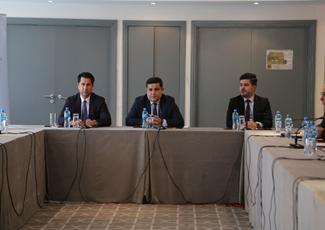
At the initiative of Azerbaijani Ombudsperson Sabina Aliyeva and in partnership with the United Nations, a roundtable was convened in Baku to discuss “Enhancing collaboration in the development of a National Action Plan on Business and Human Rights.”
The event brought together staff from the Ombudsman’s Office, representatives of relevant government agencies, business organizations, and civil society organizations.
During the opening remarks, Head of the Office Aydın Safikhanlı highlighted that the State has been taking consistent steps to create effective legislation and institutional mechanisms to support business development and entrepreneurship, while also improving the business environment.
The Head of the Office emphasized that Azerbaijan attaches particular importance to the implementation of the “UN Guiding Principles on Business and Human Rights”.
Furthermore, comprehensive information was provided about the activities of the Azerbaijani Ombudsperson in the field of business and human rights, including the trainings organized to raise awareness and exchange experiences in this area.
Mr. Safikhanli also noted that the Ombudsman’s annual reports include recommendations regarding how to prepare a National Action Plan on Business and Human Rights.
Then, Zaur Valimammadli, Head of the Department of Cooperation with International and Civil Society Organizations at the Office of Ombudsperson, made a presentation on “International Experience in Business and Human Rights and the Preparation of a National Baseline Assessment.” During his speech, the speaker spoke about the UN Guiding Principles, international practice in the field of the development of the relevant NAP, as well as the work carried out by the Azerbaijani Ombudsperson. He also reported on the process of preparation of a national baseline assessment on business and human rights, emphasizing that it is important for studying international experience in shaping effective national-level mechanisms.
The event was concluded with discussions in which participants shared their recommendations and changed their views on the NAP on Business and Human Rights to be developed.
EFFECTIVE PARLIAMENTARY OVERSIGHT: NATIONAL AND INTERNATIONAL EXPERIENCE.
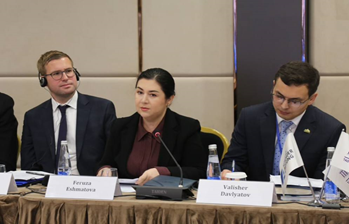
On 26 November 2025, the Parliamentary Research Institute, in cooperation with the Uzbekistan Office of Germany’s Konrad Adenauer Foundation, held an international scientific-practical conference on “Effective Parliamentary Oversight: National and International Experience.” The event was attended by deputies of the Legislative Chamber of the Oliy Majlis, the Human Rights Commissioner (Ombudsman) of the Oliy Majlis, the Ombudsperson for Children’s Rights (Children’s Ombudsman), as well as international experts, professors, members of the Youth Parliament and media representatives from Germany, Finland, India and Hungary.
In their remarks, speakers stressed the growing role of parliamentary oversight in promoting transparency, accountability and the protection of human rights in society.
Speaking at the event, the Human Rights Commissioner (Ombudsman) of the Oliy Majlis of the Republic of Uzbekistan, Feruza Eshmatova, emphasized that the Ombudsman institution, as an important link in the system of parliamentary oversight, actively contributes to the implementation of state policy in the field of human rights. She noted that behind every appeal submitted by a citizen lies a human destiny, as well as their rights and interests, and that in the course of examining these appeals, the root causes of specific problems are identified. Most importantly, cooperation between the Ombudsman and Parliament has become an integral part of state policy aimed at protecting human rights and contributes to the formation of open, responsible and just governance that serves the interests of the people.
Within the framework of the conference, experts from Germany, Finland, India and Hungary exchanged views on international experience in exercising parliamentary oversight, transparency of budgetary processes, constitutional review and strengthening accountability in the context of digital transformation.
FEDERAL OMBUDSMAN INSPECTION TEAM EXPRESSES SERIOUS CONCERN OVER POOR CONDITION OF WARDS, LACK OF CLEANLINESS IN PIMS HOSPITAL.
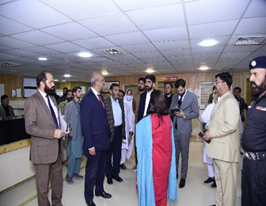
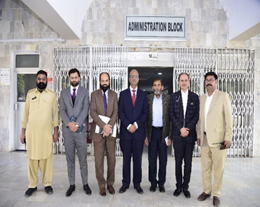
- INSPECTION TEAM EXPRESSES SERIOUS CONCERN OVER POOR CONDITION OF WARDS, LACK OF CLEANLINESS IN PIMS HOSPITAL
- OUT SOURCING LEADS TO DETERIORATION IN QUALITY OF SERVICES
- DIRECTS HOSPITAL ADMINISTRATION TO INITIATE URGENT REMEDIAL MEASURES
Islamabad: 18 November 2025 – Federal Ombudsman’s Inspection Team, which visited the PIMS Hospital here today, expresses its serious concern over the appalling state of affairs prevailing in the federal capital’s main Hospital especially the lack of cleanliness and unhygienic conditions in the wards and directed the hospital administration to initiate urgent remedial measures for arresting the declining trends.
Headed by its Director General, Mr. Ashfaq Ahmad the 5-member Team visited the hospital under the directions of the Wafaqi Mohtasib, Mr. Ejaz Ahmad Qureshi. It went round various wards and sections of the Hospital to look into the complaints of maladministration emanating therefrom. It was found that the outsourcing of various sections has led to marked deterioration in the quality of services available there.
On its arrival, the Inspection Team witnessed huge crowd of patients in nearly every department of the hospital. Similarly, a pandemonium was witnessed in the departments which were out sourced earlier as their performance remained pathetic. Moreover, the stretchers and wheelchairs in the emergency department were also not up to the mark. Keeping in view the pathetic conditions prevailing there, the Inspection Team directed that in future all contracts for outsourcing must be awarded after carefully reviewing the credentials and performance of the private companies concerned.
The Inspection Team also instructed that a token system may be introduced in the hospital’s lab in view of the rapidly growing number of patients. It also instructed that the number of ECG rooms may be increased from 3 to 5, providing a separate facility for the ladies. The Team further asked the administration to hand over the swindlers and beggars sneaking into the hospital to police and also to take immediate steps for dealing with the menace of stray dogs roaming around.
Earlier, the Team was informed in a briefing that two MRI machines and 28 machines for ultrasound are functional in the Hospital. The administration further stated that 93 vacancies of the doctors have been filled through the FPSC. Similarly, appointments have been made to fill 113 non-gazetted posts while some posts are still lying vacant. The Team was informed that nearly 10,000 patients visit the hospital daily, putting great stress on its meagre resources. It said that the gynae ward alone has to conduct ultrasound of more than 3,000 patients daily. The Inspection Team directed that the process of recruitment may be expedited for filling the remaining vacancies with highest consideration for merit and transparency in the entire exercise.
PAYMENT OF DUES TO STATIONERY SUPPLIERS — TOTAL AMOUNT RUPEES TEN MILLION, FIVE HUNDRED SIXTY THOUSAND, SIGNIFICANT PROGRESS IN COMPLAINT REDRESSAL.

The Office of the Ombudsman Punjab, took decisive action against the long-standing delays in payments owed to multiple stationery supplier companies of Punjab. The companies had approached the Ombudsman Office with complaints regarding delayed dues from various provincial departments, citing procedural hurdles and administrative bottlenecks.
Upon receiving these grievances, the Ombudsman Punjab initiated a formal inquiry to identify the causes of delay and ensure that suppliers were not subjected to unnecessary financial strain. In one notable case, the intervention led to the release of Rs. 1.335 million to a supplier whose payment had been pending despite multiple follow-ups.
Recognizing the impact of such administrative delays, the Ombudsman Punjab issued clear directions to expedite pending payments and ensure that the rightful dues of all stationery suppliers are processed without further delays. This proactive approach reflects the Ombudsman Punjab’s commitment to ensuring fairness, transparency, and administrative accountability. The complainants appreciated the prompt response and a citizen-friendly service.
